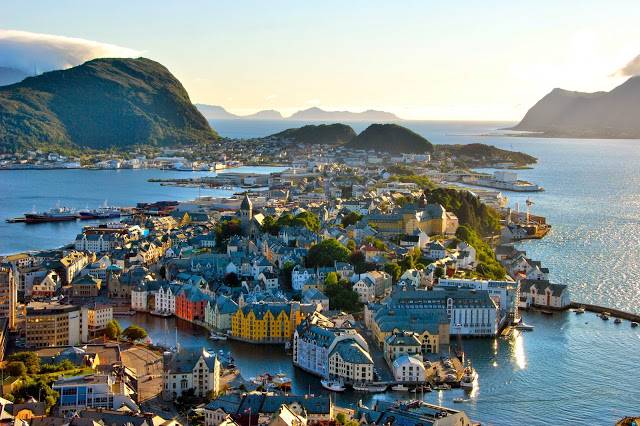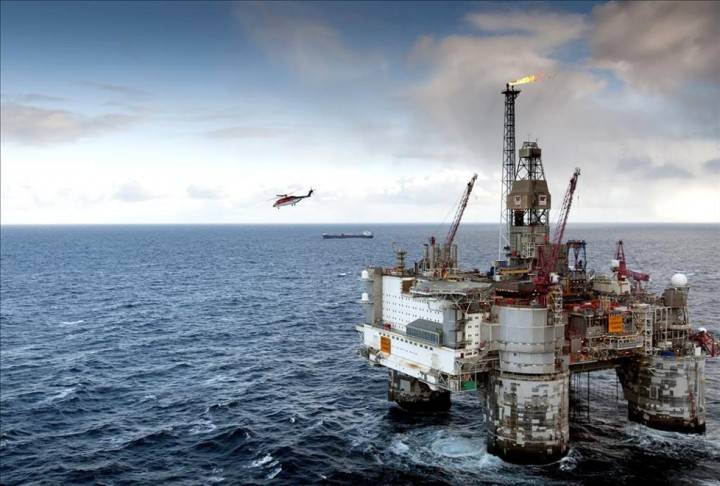Jump off the oil needle: Norway, Emirates ... Who's next?
In the first half of the twentieth century, Norway was one of the poorest and most economically underdeveloped countries of Europe. At least, the standard of living of the population in this country could not be called high. Most of the population lived in rural areas and was engaged, as far as climatic conditions allowed, in agriculture. There was a very high unemployment rate.

In search of a better life from 1850 to 1920, over 800 thousands of Norwegians emigrated from country to North America (given the small population of the country, this was a significant population loss). The Second World War became a serious test for the country. However, in 1969, large reserves of oil were found in the North Sea, after which the position of Norway radically changed. The development of oil fields has led to the fact that Norway has become an oil power. The standard of living of the population has sharply increased, the quality of life has improved.
The super-profits from the sale of oil led to the fact that Norway has become the most prosperous socially and economically state in Europe. Here - one of the highest standards of living in the world, high average life expectancy, the majority of citizens live in comfortable conditions and enjoy many advantages. In 1990, the Norwegian sovereign pension fund was established, where surplus funds were received from the sale of oil resources. Officially, the foundation proclaims its goal is to preserve oil revenues for the needs of future generations of Norwegians.
The main revenues in the sovereign pension fund of Norway for a long time carried out at the expense of funds from the sale of oil. The fund then began to make independent investments, becoming one of the key global investors with a “wallet” of shares that make up 1,3% of the entire global stock market. The value of the assets of the sovereign pension fund of Norway in 2017 year exceeded 1 trillion dollars. That is, we see the scale of this organization and its financial capabilities.
By the way, on a global scale, the Norwegian pension fund ranks third in the world in terms of funds. China retains its first place at the expense of the total assets of four sovereign funds valued at 1,6 trillion dollars, and the second place is the United Arab Emirates, whose assets in six sovereign funds 1,3 trillion dollars. Since there is only one sovereign fund in Norway, in fact it is the largest in the world - Chinese and UAE funds ensure their superiority in finance through the aggregate of funds in four funds of the PRC and six funds of the UAE, respectively.

The funds from the Norwegian sovereign pension fund are drawn from three main sources - the purchase of shares, the purchase of bonds and real estate investments. At the same time, the share of shares of oil and gas companies is 5,5% of the fund's investments, they also bring the most serious income - 8,5% of the total income received from the shares. In total, the fund has shares in the oil and gas sector worth 35 billions of dollars. The fund has shares in such global giants of the oil and gas industry as Shell (2,1%) and BP (1,6%). There is a sovereign pension fund in Norway and investments in shares of Russian companies - the fund owns 0,5% of Transneft shares, 0,5% of Novatek shares, 0,4% of Gazprom shares, 0,4% of Gazpromneft shares, Lukoil 0,37%.
The Norwegian company Statoil on 67% is owned by the state, being one of the thirty oil and gas "giants" of the world economy. Norwegian oil attracts many buyers, including the neighboring Baltic states, who are terribly concerned about their energy dependence on Russian resources and expect sooner or later to reduce this dependence by reorienting to Norway. Western European countries also buy Norwegian raw materials, although they remain dependent on Russian oil and gas supplies. In this regard, the recent statement by the sovereign pension fund on the gradual reduction of investment in the oil and gas industry seems very strange. However, it is only at first glance. In fact, the situation is much more interesting.
In recent years, there has been a long-term decline in oil and gas prices on a global scale. This decline can already be called a trend, which in one way or another will determine the global socio-economic and political development in the present and in the near future. Naturally, in the face of declining oil prices, many states are trying to reduce their dependence on revenues associated with both the export of raw materials and investments in the oil and gas sector and the securities of this sector. Norway is no exception. Analysts of the Norwegian Bank have already managed to calculate that if the cost of a barrel of oil drops to 12 dollars, this will have a very negative impact on the revenues of the sovereign pension fund related to investments in the oil and gas sector. These revenues will be reduced by more than two times, which will inevitably affect the economic well-being of the Norwegian state.
Meanwhile, the costs of the Norwegian state are increasing, and this is due to the need to maintain a regime of maximum social well-being for Norwegian citizens. In particular, as lawyer Andrei Lisov says, the Norwegian government has repeatedly stated its intention to cut taxes. But the cost of the country more and more, it turns out that the plans and reality are contradictory. According to the lawyer, in any case in the near future will have to adjust the activities of the sovereign pension fund of Norway. If Norway fails to get off the oil needle, the economic situation in the country may seriously deteriorate in the future. To prevent this, it is proposed to significantly reduce investment in the oil and gas sector.
Refusal to invest in the oil and gas industry is also associated with changes in the very paradigm of Norway’s energy development in the 21st century. Sovereign pension fund has long paid great attention to environmental issues. The pursuit of green technologies is another incentive to get rid of the oil needle. The head of the Norwegian Greenpeace, Truls Gulovsen, believes that the best solution for Norway would be to redirect funds freed from the oil and gas sector to the development of alternative energy and hydropower. Emphasis must be placed on renewable resources, including solar energy, wind energy. It is in the construction of wind and hydroelectric power stations that Gulovsen calls for investing funds from a sovereign pension fund.
Note that before, guided by the idea of combating climate change and global warming, the sovereign pension fund sold off most of its coal assets. The fund also refused to participate in the activities of companies involved in the production and sales of nuclear weaponswith a tobacco business. That is, ideological considerations are attached to economic and financial considerations. Norway seeks to position itself as a super-modern state, focused on environmental values and refusing technologies that are harmful to the environment. The oil and gas industry, of course, falls under this definition and becomes the target of an ecological lobby, quite influential in modern Norwegian politics.
Many countries of the world want to get off the oil needle. Norway is not alone in this regard. “The Curse of Black Gold” is what world mass media call raw material dependence on and there really is some truth in this. The well-being of many states, especially in Asia and Africa, was entirely based on oil exports. It was thanks to the oil sector that Muammar Gaddafi succeeded in his time in turning Libya into a prosperous country compared to other African economies. Oil production in the second half of the twentieth century completely changed the face of the feudal monarchies of the Persian Gulf. The impoverished sheikhs and emirates, still 100 years ago inhabited by nomadic camels and fishermen, became the richest nations in the world. Their indigenous people began to receive their share of rent from oil exports, although the share of the indigenous population has declined - in some countries of the Persian Gulf, guest workers from South and Southeast Asia and East Africa make up 90% of the population.
The fact that it is time to tie with the "oil addiction", today they say in the countries of the Persian Gulf. Perhaps the most successful country in this respect is the United Arab Emirates. With the help of the proceeds from the sale of oil, the UAE managed to turn Dubai into a super modern city, the financial capital of South-West Asia and the largest center of tourism. In 2016 alone, more than 20 million tourists from all over the world visited Dubai. A few decades ago, no one could have imagined that tourists would go to the United Arab Emirates - apart from oil derricks, the sandy desert and the Bedouins, there was simply nothing to watch. But the UAE authorities prudently began to invest the proceeds from the sale of oil funds in the development of the tourism industry. Infrastructure recreation and entertainment was created literally from scratch, and at a high level. The result - investment in the tourism sector has made it possible to turn tourism into a source of huge revenue for the state. Oil resources will ever end, and sandy beaches, luxury hotels and even a ski resort in the hot desert will remain.
Secondly, Dubai has long been turned into the main staging base of the Old World. Through Dubai fly anywhere - to Africa, to Southeast and South Asia, to Australia. For example, in Dubai, there is a transfer to flights to the countries of the Asia-Pacific region and the Indian Ocean from many Moscow flights. The development of air transport infrastructure means a lot to the United Arab Emirates. Transforming the country into a tourist and transportation hub, the UAE takes care of expanding the most profitable sectors of the economy that do not depend directly on the oil sector.

As in Norway, in the UAE, great attention is paid to the issues of switching to alternative methods of producing energy. The government of the Emirates invested 35 billion dollars in exemption from oil dependence. In Abu Dhabi, Masdar’s “city of the sun” is being built. This is the project of the first settlement in the world, which will be fully provided by solar energy and other renewable energy sources. Thus, the city will be free from harmful emissions. It is assumed that up to 50 thousand people will live in Masdara, and about 60 thousand more people will come to this city every day to work. The population of the city will consist of scientists, engineers, technicians working on various studies and developing their own projects.
The authorities of Dubai and other emirates pay great attention to the introduction of innovative technologies into the economy of the UAE. Thus, it is planned to gradually transfer the entire state management infrastructure to blockchain technology. Mohammed Al-Seli, General Director of ArabianChain Technology, believes that there are no obstacles in Dubai to transfer the state management system to the use of blockchain technologies. Now government agencies and private companies are working together to introduce blockchain technologies into the business and management of the emirate of Dubai.
The plans to jump off the oil needle is increasingly being announced by the Saudi authorities. Of course, the situation here is more complicated than in the UAE, considering both the large population and the large territory. But Saudi Arabia is increasingly seeking to invest in the development of other areas of the economy. The activities of wealthy and prosperous oil and gas exporters can become an example for Russia - in which direction should our country move in order to gradually reduce the economy’s dependence on the export of natural resources.

Information